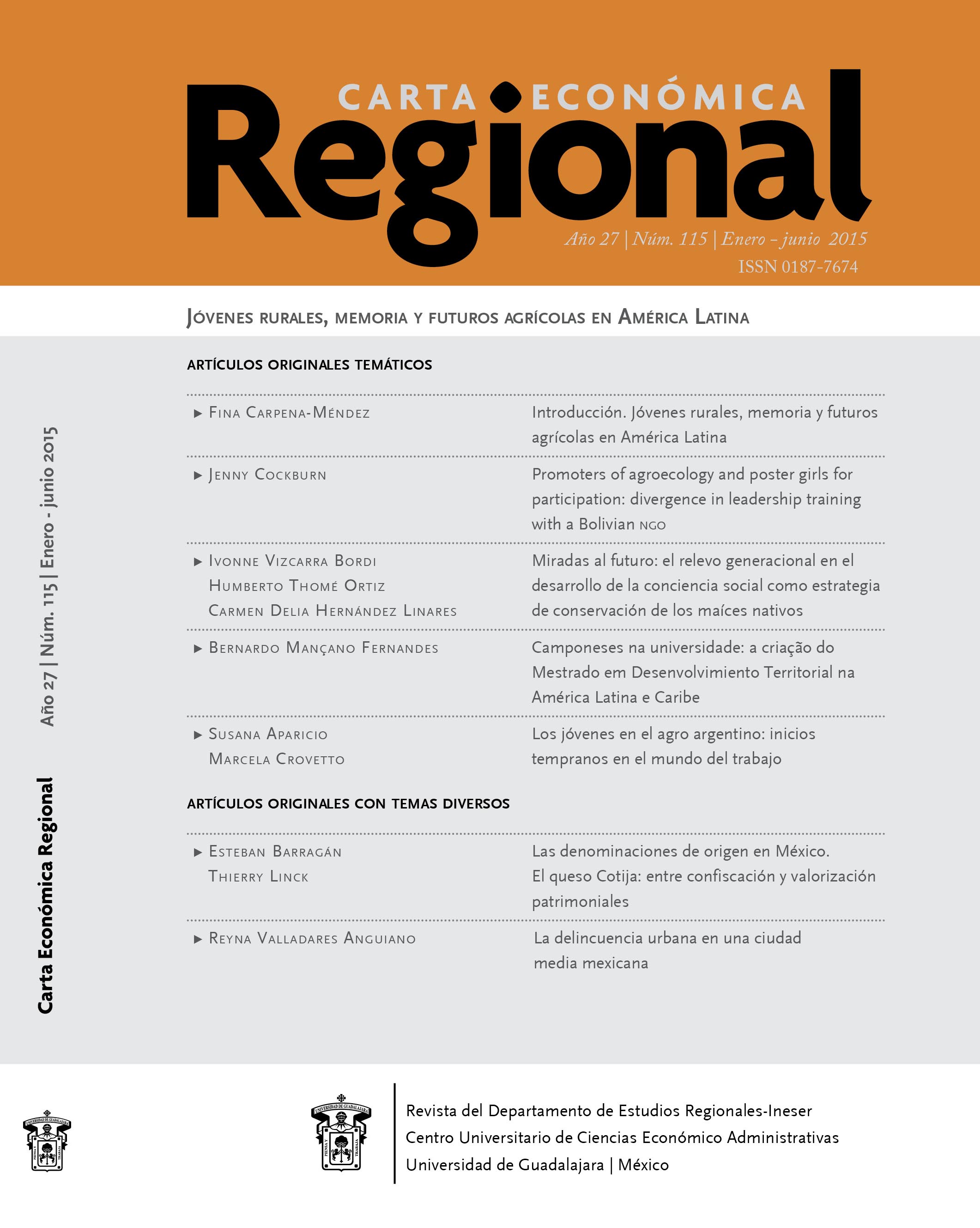Promoters of agroecology and poster girls for participation: divergence in leadership training with a Bolivian ngo
Resumen
This article examines rural Bolivian youth within farm households engaged in participatory agroecology development with an ngo. A central component of this work involves ‘leadership’ training. Despite certain politicized aspects, it tends to operate in neoliberal and technical ways, resulting in greatly diverging experiences for participants along gendered and generational lines. e buzzword nature of the term raises questions of how it is used and what is glossed over. ese issues are examined through vignettes, with particular attention to one teenaged girl who attended workshops to become a leader in organic production and became a symbol of the ngo’s success with youth and women’s ‘empowerment.’ Her motives to participate involved familial pressure, a desire to network toward relocation, and nally, some interest in the sustainability of her household’s farm and community.Citas
Andolina, R., Laurie, N. & Radcliffe S. (2009). Indigenous development in the Andes: culture, power and transnationalism. Durham: Duke University Press.
Cleaver, F. (2004). The social embeddedness of agency and decision-making. In Hickey, S. & Mohan, G. (eds.), Participation: from tyranny to transformation? Exploring new approaches to participation in development (271-277). London and New York: Zed Books.
Cockburn, J. (2015). Local knowledge/lacking knowledge: contradictions in participatory agroecology development in Bolivia. Anthropologica, 57(1), 169-184.
Cockburn, J. (2014). Bolivia’s food sovereignty and agrobiodiversity: undermining the local to strengthen the state?. Theory inAction, Journal of TSI, 7(4), 67-89.
Cooke, B. and Kothari, U. (2001), Participation: The New Tyranny? London: Zed Books.
Deere, C. D. (2005). “The Feminisation of Agriculture? Economic Restructuring in Rural Latin America.” Occasional Paper 1. Geneva: UN Research Institute for Social Development.
De Schutter, O. (2013). The agrarian transition and the ‘feminization’ of agriculture. Retrieved of http://www.yale.edu/agrarianstudies/foodsovereignty/pprs/37_deSchut-ter_2013.pdf.
Goodale, M. (2008). Dilemmas of modernity: Bolivian encounters with law and liberalism.Stanford, CA: Stanford University Press.
Haarstad, H. & Andersson, V. (2009). Backlash reconsidered: neoliberalism and popular mobilization in Bolivia. Latin American Politics and Society, 51(4), 1–28.
Hale, C. R. (2002). Does multiculturalism menace? Governance, cultural rights and the politics of identity in Guatemala. Journal of Latin American Studies, 34, 485-524.
Healy, K. (2001), Llamas, weavings and organic chocolate: multicultural grassroots development in the Andes and Amazon of Bolivia. Notre Dame: University of Notre Dame Press.
Hickey, S. & Mohan, G. (eds.) (2004). Participation: from tyranny to transformation? Exploring new approaches to participation in development. London: Zed Books.
Leal, P. A. (2010). Participation: the ascendancy of a buzzword in the neo-liberal era. In Cornwall, A. & Eade, D. (eds.), Deconstructing development discourse buzzwords and fuzzwords (89-100). Warwickshire: Practical Action Publishing Ltd.
Ong, A. (2006). Neoliberalism as exception. Durham and London: Duke University Press.
Phillips, L. & Ilcan, S. (2004). Capacity-building: the neoliberal governance of development. Canadian Journal of Development Studies, 25(3), 393–409.
Postero, N. (2013). Bolivia’s challenge to ‘colonial neoliberalism.’ In Goodale, M. & Postero, N. (eds.), Neoliberalism, interrupted: social change and contested governance in contemporary Latin America. (25-52). Stanford, CA: Stanford University Press.
Punch, S. (2002). Youth transitions and interdependent adult–child relations in rural Bolivia. Journal of Rural Studies, 18, 123-133.
Aquellos autores/as que tengan publicaciones con esta revista, aceptan los términos siguientes:
- Los autores/as conservarán sus derechos de autor y garantizarán a la revista el derecho de primera publicación de su obra, el cuál estará simultáneamente sujeto a la Licencia de reconocimiento de Creative Commons que permite a terceros compartir la obra siempre que se indique su autor y su primera publicación esta revista.
- Los autores/as podrán adoptar otros acuerdos de licencia no exclusiva de distribución de la versión de la obra publicada (p. ej.: depositarla en un archivo telemático institucional o publicarla en un volumen monográfico) siempre que se indique la publicación inicial en esta revista.
- Se permite y recomienda a los autores/as difundir su obra a través de Internet (p. ej.: en archivos telemáticos institucionales o en su página web) déspues de que su trabajo sea publicado, lo cual puede producir intercambios interesantes y aumentar las citas de la obra publicada. (Véase El efecto del acceso abierto).


_(1).jpg)






.png)



